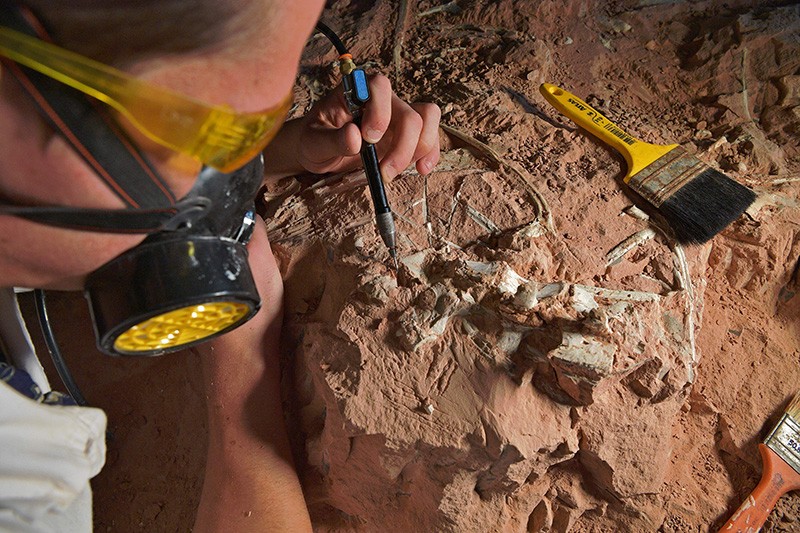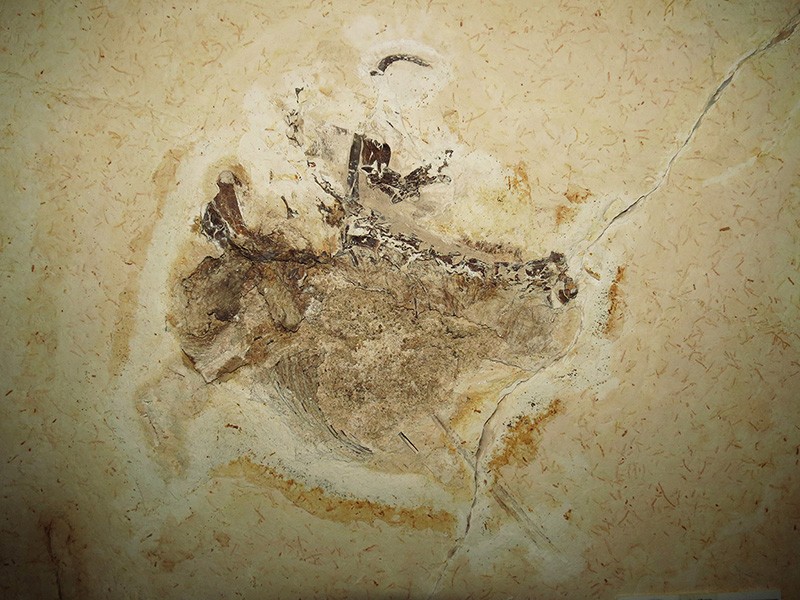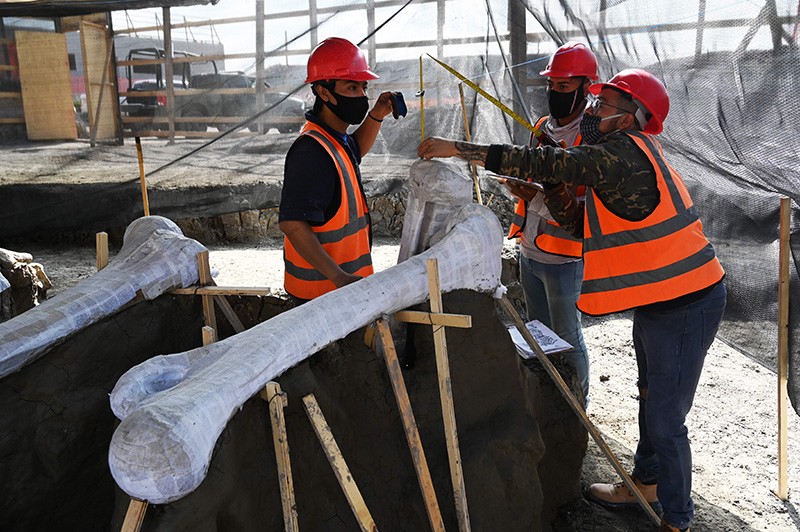
A palaeontologist examines a dinosaur fossil from the Triassic interval (round 250 million to 200 million years in the past) in Brazil.Credit: Carl de Souza/AFP through Getty
In December 2020, a paper within the journal Cretaceous Research despatched shock waves by way of the palaeontology neighborhood1. It described a dinosaur species that the authors named Ubirajara jubatus — the primary dinosaur discovered within the Southern Hemisphere to show what had been in all probability precursors to fashionable feathers. The 110-million-year-old fossil had been collected in Brazil a long time earlier — however no Brazilian palaeontologist had ever heard of it. The authors of the paper had been from Germany, Mexico and the United Kingdom.
It was the newest occasion of what some researchers now name palaeontological colonialism, wherein scientists from rich nations receive specimens from low- and middle-income international locations with out involving native researchers, after which retailer the fossils overseas. The observe can generally be unlawful. For occasion, in accordance to Brazilian legislation, the nation’s fossils belong to the state, though the authors of the Ubirajara paper say that that they had a allow signed by a Brazilian mining official permitting them to export the specimen. “As far as the authors are aware, the specimen of Ubirajara was obtained legally,” says David Martill, a co-author and palaeontologist on the University of Portsmouth, UK.
The observe may also deprive nations of data and heritage, say researchers. “Fossils are special to us,” says Allysson Pinheiro, director of the Plácido Cidade Nuvens Palaeontological Museum in Santana do Cariri, Brazil, close to the place U. jubatus was discovered. “We have literature, arts and crafts, and music based on them.”
Unlike earlier incidents, nevertheless, the publication of Ubirajara sparked a revolution.
Through the Twitter marketing campaign #UbirajaraBelongstoBR, Brazilian researchers protested in opposition to the paper, which was ultimately withdrawn, and known as for the fossil’s return. The Ubirajara specimen is at present positioned on the State Museum of Natural History Karlsruhe in Germany, however officers say that the museum is concerned in negotiations to ship it again to Brazil.

The Ubirajara jubatus fossil sparked outrage amongst Brazilian palaeontologists and residents.Credit: Felipe L. Pinheiro
Even extra considerably, the incident prompted palaeontologists and palaeontology associations throughout Latin America to be part of forces to finish the observe. The rising movement is even attracting curiosity from scientists in Mongolia and different international locations past Latin America which can be affected by colonial palaeontology.
Juliana Sterli, president of the Argentinian Paleontological Association in Buenos Aires, describes the Ubirajara episode because the “last drop”. “In previous situations, we didn’t express ourselves,” she says.
Global consciousness
One of the fruits of the movement has been the publication of journal articles surveying the extent of palaeontological colonialism in Latin America and elsewhere. In March, for example, a report2 reviewed a long time of papers describing fossils from Mexico and Brazil. The authors analysed nearly 200 research printed between 1990 and 2021, and located that greater than half didn’t embrace native researchers. Of the Brazilian fossils described, 88% had been saved outdoors Brazil.
Some in the neighborhood, nevertheless, have disputed the paper’s findings. Martill says that the paper “is a pseudo-scientific study with a highly cherry-picked data set”, and provides that it ignores practices by US palaeontologists and focuses on European researchers. Martill was a co-author on papers highlighted by the survey.
Juan Carlos Cisneros, a palaeontologist on the Federal University of Piauí in Teresina, Brazil, and a co-author of the survey, says that it omitted some US collections of Brazilian fossils relationship from earlier than 1990. That is as a result of the survey targeted on vertebrate holotypes (specimens used as benchmarks for describing a species) studied after 1990, he explains. That is when Brazil handed a decree that requires worldwide establishments learning fossils from the nation to accomplice with Brazilian establishments. Cisneros provides: “It seems a clumsy attitude for researchers involved in such questionable practices to defend themselves by expressing that, in other countries, similarly questionable things are done.”
In the previous, when problems with scientific colonialism had been introduced up with colleagues in rich international locations, incidents had been chalked up to anecdotal occurrences, he says. “Now that this is published in a scientific journal, there’s no way to ignore it anymore.”
Jeff Liston, president of the European Association of Vertebrate Palaeontologists, who is predicated in Edinburgh, UK, and has studied the unlawful fossil commerce in China, says that the scientific neighborhood has been conscious of points associated to colonial palaeontology for a while — however the debate previously few years has introduced the dialogue to a broader viewers.
There are plans for extra publications on the problem in Latin America — together with papers discussing how journals might help to remedy the issue. The palaeontological associations of Argentina, Brazil, Chile and Mexico plan to submit a letter describing how colonial practices are affecting palaeontology within the area to a scientific journal. “One of our goals is to raise global awareness about the responsibility of peer-reviewed journals in fighting colonial practices,” says Hermínio de Araújo Júnior, president of the Brazilian Paleontological Society, who is predicated in Rio de Janeiro.
In the March paper2, for instance, the researchers discovered that not one of the research they reviewed reported having permits for taking the fossils overseas. “A big step would be to request the proper permits to study the material that they are putting into the journal,” says Karen Moreno Fuentealba, president of the Chilean Association of Paleontology, which is predicated in Santiago. “It would certainly be a way to enforce proper scientific behaviour.”
Some journals, comparable to Palaeontology, have already adopted insurance policies that require authors to respect native legal guidelines when amassing and exporting samples. “PLoS ONE was one of the first journals to have a very tight set of ethical guidelines in terms of having to show collecting and export permits,” Liston says. (Nature additionally has such a coverage; Nature’s information group is editorially impartial of its journal group.)
A Latin American alliance
Latin American researchers have additionally raised world consciousness of colonial palaeontology at worldwide conferences. Last December, Cisneros introduced analysis on the third annual Palaeontological Virtual Congress, wherein he and his group analysed the impression of the #UbirajaraBelongstoBR marketing campaign. The hashtag grew to become a trending subject on Twitter in Brazil between December 2020 and January 2021, after the Cretaceous Research paper was printed.
“Not only science communicators engaged in the conversation, but also influencers from the gaming world, artists and the news media gave it wide attention,” says Aline Ghilardi, a palaeontologist on the Federal University of Rio Grande do Norte in Natal, Brazil, who created the hashtag.
Liston notes these constructive outcomes, however says that there have been adverse ones, too. Members of the general public threatened the scientists and establishments concerned within the Ubirajara analysis. The Karlsruhe museum’s Instagram account drew greater than 10,000 feedback — lots of them adverse — and was deleted in 2021.
In July, a panel will talk about scientific colonialism on the digital Latin American Congress of Vertebrate Paleontology. The objective, in accordance to Cisneros, is to promote true cooperation between palaeontologists. “We don’t want researchers from other countries to stop working here. What we hope for is that partnerships are more equitable and reciprocal. And that our laws are respected, as we respect the laws of other countries.”

Palaeontologists in Mexico work to protect mammoth skeletons discovered throughout an excavation in 2020.Credit: Rodrigo Arangua/AFP through Getty
Martill says he has no downside cooperating with native researchers, however he has questions on how far the movement will go to revise the sphere. “Should we be expected to [collaborate with local partners] when, say, a Brazilian fossil is in a German collection and has been for many years?” he asks, moreover questioning whether or not searching for out consultants merely to add native collaborators could lead on to tokenism. “I think this should be up to authors who do the science to decide who is an author.”
It’s necessary to acknowledge that moral requirements at the moment are completely different from these of the previous, even in Latin America, says Elizabeth Chacón Baca, president of the Mexican Society of Paleontology, headquartered in San Nicolás de los Garza. In Mexico, for instance, fossils used to be provided as items by political leaders or lecturers to their worldwide counterparts. “Scientific interest must prevail,” she says. “We must protect and defend [our heritage], but always with a tone of open dialogue.”
Ripple results
Latin American palaeontologists hope that their efforts will have an effect past their international locations. According to a examine printed final December by Ghilardi and others3, the international locations most affected by ‘parachute science’ — publications that make no point out of native collaboration — are the Dominican Republic, Myanmar and Namibia. In the primary two, specifically, overseas researchers have turn out to be excited about fossil inclusions in amber deposits.
Palaeontological colonialism “used to be a discussion among friends and peers in between two sessions at a conference”, says Devapriya Chattopadhyay, a palaeontologist on the Indian Institute of Science Education and Research in Pune and a co-author of the examine. Now, “it is getting quite a bit of deserved attention”.
“I’m really excited about this whole movement, especially in Brazil,” says Bolortsetseg Minjin, founder and director of the Institute for the Study of Mongolian Dinosaurs in New York City. She has helped to repatriate dinosaur fossils taken illegally from Mongolia, and sees parallels between her efforts and the marketing campaign to repatriate the Ubirajara dinosaur.
Minjin strongly advocates that fossils stay of their locations of origin. “In Mongolia, fossils have been out of the country for the last 100 years,” she says. “Now we are facing an issue: how to find the next generation of scientists?” When kids don’t develop up seeing fossils as a part of their heritage and aren’t uncovered to information that excites them, she says, there’s little motivation to turn out to be scientists.
How a Brazilian dinosaur sparked a movement to decolonize fossil science & More Latest News Update
How a Brazilian dinosaur sparked a movement to decolonize fossil science & More Live News
All this information that I’ve made and shared for you individuals, you’ll prefer it very a lot and in it we hold bringing matters for you individuals like each time so that you just hold getting information data like trending matters and also you It is our objective to have the ability to get
every kind of stories with out going by way of us in order that we will attain you the newest and finest information without cost so to transfer forward additional by getting the data of that information along with you. Later on, we’ll proceed
to give details about extra today world news update kinds of newest information by way of posts on our web site so that you just at all times hold transferring ahead in that information and no matter sort of data can be there, it is going to positively be conveyed to you individuals.
How a Brazilian dinosaur sparked a movement to decolonize fossil science & More News Today
All this information that I’ve introduced up to you or would be the most completely different and finest information that you just individuals are not going to get anyplace, together with the data Trending News, Breaking News, Health News, Science News, Sports News, Entertainment News, Technology News, Business News, World News of this information, you may get different kinds of information alongside together with your nation and metropolis. You can be ready to get data associated to, in addition to it is possible for you to to get details about what’s going on round you thru us without cost
so to make your self a educated by getting full details about your nation and state and details about information. Whatever is being given by way of us, I’ve tried to carry it to you thru different web sites, which you’ll like
very a lot and for those who like all this information, then positively round you. Along with the individuals of India, hold sharing such information vital to your family members, let all of the information affect them they usually can transfer ahead two steps additional.
Credit Goes To News Website – This Original Content Owner News Website . This Is Not My Content So If You Want To Read Original Content You Can Follow Below Links
